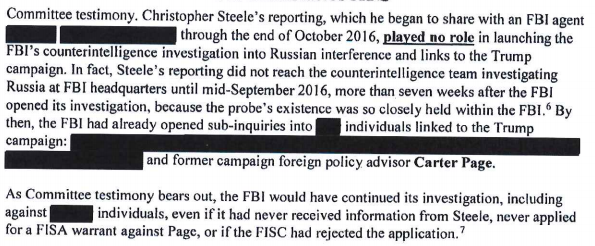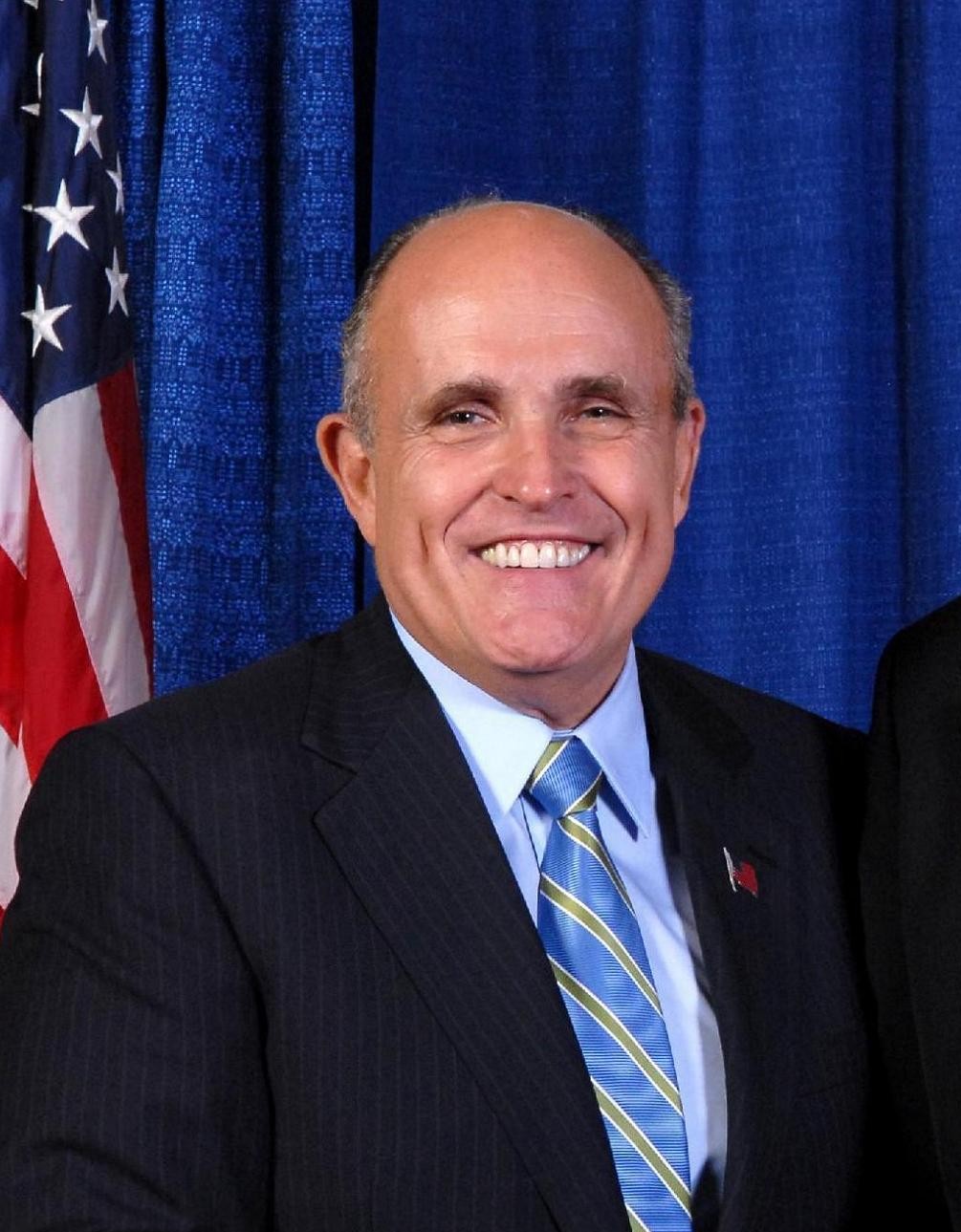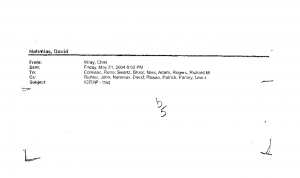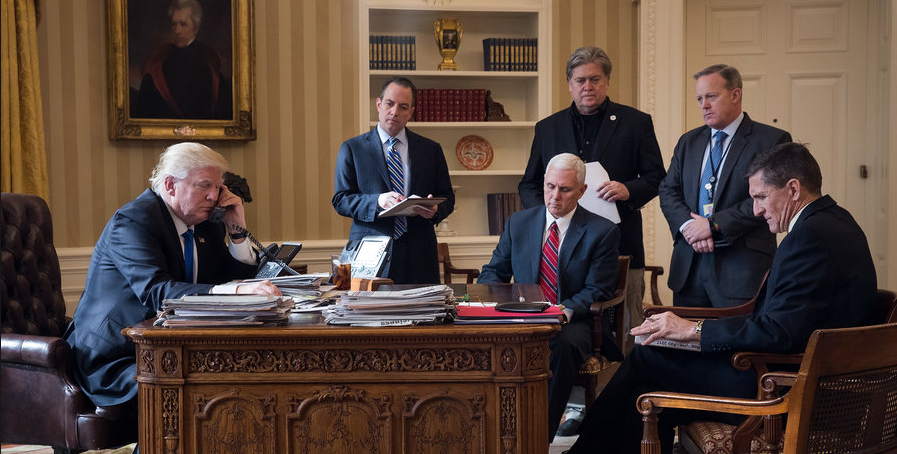As I noted in this post, Robert Mueller’s team of “Attorneys for the United States of America” responded to Paul Manafort’s claim that Rod Rosenstein’s grant of authority to the Special Counsel did not extend to the money laundering he is currently being prosecuted for by revealing an August 2, 2017 memo from Rosenstein authorizing Mueller to investigate, along with a bunch of redacted stuff,
Allegations that Paul Manafort:
- Committed a crime or crimes by colluding with Russian government officials with respect to the Russian government’s efforts to interfere with the 2016 election for President of the United States, in violation of United States law;
- Committed a crime or crimes arising out of payments he received from the Ukrainian government before and during the tenure of President Viktor Yanukovych.
As the filing notes, this memo has not been revealed before, neither to us nor to Manafort.
That’s all very interesting (and has the DC press corps running around claiming this is a big scoop, when it is instead predictable). More interesting, however, is the date, which strongly suggests that there are more of these memos out there.
Mueller is unlikely to have waited two and a half months to memorialize his scope
I say that, first of all, because Rosenstein wrote the August 2 memo two and a half months after he appointed Mueller. Given Trump’s raging attacks on the investigation, it’d be imprudent not to get memorialization of the scope of the investigation at each step. Indeed, as I’ve noted, in the filing Mueller points to the Libby precedent, arguing that this memo “has the same legal significance” as the two memos Jim Comey used to (publicly) memorialize the scope of Patrick Fitzgerald’s investigation.
The August 2 Scope Memorandum is precisely the type of material that has previously been considered in evaluating a Special Counsel’s jurisdiction. United States v. Libby, 429 F. Supp. 2d 27 (D.D.C. 2006), involved a statutory and constitutional challenge to the authority of a Special Counsel who was appointed outside the framework of 28 C.F.R. Part 600. In rejecting that challenge, Judge Walton considered similar materials that defined the scope of the Special Counsel’s authority. See id. at 28-29, 31-32, 39 (considering the Acting Attorney General’s letter of appointment and clarification of jurisdiction as “concrete evidence * * * that delineates the Special Counsel’s authority,” and “conclud[ing] that the Special Counsel’s delegated authority is described within the four corners of the December 30, 2003 and February 6, 2004 letters”). The August 2 Scope Memorandum has the same legal significance as the original Appointment Order on the question of scope.
The first of those Comey letters, dated December 30, 2003, authorized Fitz to investigate the leak of Valerie Plame’s identity. The second of those, dated February 6, 2004, memorialized that Fitz could also investigate,
federal crimes committed in the course of, and with intent to interfere with, your investigation, such as perjury, obstruction of justice, destruction of evidence, and intimidation of witnesses; to conduct appeals arising out of the matter being investigated and/or prosecuted; and to pursue administrative remedies and civil sanctions (such as civil contempt) that are within the Attorney General’s authority to impose or pursue.
It’s the second memo that memorialized Fitz’ authority to prosecute Scooter Libby for protecting Dick Cheney’s role in outing Valerie Plame.
Mueller, then the acting FBI Director, would presumably have been in the loop of the Fitz investigation (as Christopher Wray is in Mueller’s) and would have known how these two letters proceeded. So it would stand to reason he’d ask for a memo from the start, particularly given that the investigation already included multiple known targets and that Trump is even more hostile to this investigation than George Bush and Dick Cheney were to Fitz’s.
Admittedly, unlike the Comey memo, which was designed for public release, there’s no obvious, unredacted reference to a prior memo. Though something that might imply a prior memo is redacted at the top of the released memo (though this is probably a classification marking).

And, given that this memo was designed to be secret, Rosenstein may have written the memo to obscure whether there are prior ones and if so how many.
The memo closely follows two key dates
That said, the date of the memo, August 2, is mighty curious. It is six days after the July 27 Papadopoulos arrest at Dulles airport. And seven days after the July 26 no knock search of Paul Manafort’s Alexandria home.
That timing might suggest any of several things. It’s certainly possible (though unlikely) the timing is unrelated.
It’s possible that Rosenstein wrote the memo to ensure those two recent steps were covered by his grant. That wouldn’t mean that the search and arrest wouldn’t have been authorized. The memo itself notes that Mueller would be obliged to inform Rosenstein before each major investigative step.
The Special Counsel has an explicit notification obligation to the Attorney General: he “shall notify the Attorney General of events in the course of his or her investigation in conformity with the Departmental guidelines with respect to Urgent Reports.” 28 C.F.R. § 600.8(b). Those reports cover “[m]ajor developments in significant investigations and litigation,” which may include commencing an investigation; filing criminal charges; executing a search warrant; interviewing an important witness; and arresting a defendant.
Both Papadopoulos’ arrest and that dramatic search would fit this criteria. So it’s virtually certain Rosenstein reviewed Urgent Memos on both these events before they happened. Plus, his memo makes it clear that the allegations included in his memo “were within the scope of the Investigation at the time of your appointment and are within the scope of the Order,” meaning that the inclusion of them in the memo would retroactively authorize any activities that had already taken place, such as the collection of evidence at Manafort’s home outside the scope of the election inquiry.
As I noted, the memo also asserts that Special Counsels’ investigative authority, generally, extends to investigating obstruction and crimes the prosecutor might use to flip witnesses.
The filing is perhaps most interesting for the other authorities casually asserted, which are not necessarily directly relevant in this prosecution, but are for others. First, Mueller includes this footnote, making it clear his authority includes obstruction, including witness tampering.
The Special Counsel also has “the authority to investigate and prosecute federal crimes committed in the course of, and with intent to interfere with, the Special Counsel’s investigation, such as perjury, obstruction of justice, destruction of evidence, and intimidation of witnesses” and has the authority “to conduct appeals arising out of the matter being investigated and/or prosecuted.” 28 C.F.R. § 600.4(a). Those authorities are not at issue here.
Those authorities are not at issue here, but they are for the Flynn, Papadopoulos, Gates, and Van der Zwaan prosecutions, and for any obstruction the White House has been engaging in. But because it is relevant for the Gates and Van der Zwaan prosecutions, that mention should preempt any Manafort attempt to discredit their pleas for the way they expose him.
The filing includes a quotation from DOJ’s discussion of special counsels making it clear that it’s normal to investigate crimes that might lead someone to flip.
[I]n deciding when additional jurisdiction is needed, the Special Counsel can draw guidance from the Department’s discussion accompanying the issuance of the Special Counsel regulations. That discussion illustrated the type of “adjustments to jurisdiction” that fall within Section 600.4(b). “For example,” the discussion stated, “a Special Counsel assigned responsibility for an alleged false statement about a government program may request additional jurisdiction to investigate allegations of misconduct with respect to the administration of that program; [or] a Special Counsel may conclude that investigating otherwise unrelated allegations against a central witness in the matter is necessary to obtain cooperation.”
That one is technically relevant here — one thing Mueller is doing with the Manafort prosecution (and successfully did with the Gates one) is to flip witnesses against Trump. But it also makes it clear that Mueller could do so more generally.
Mueller used the false statements charges against Papadopoulos to flip him. He surely hopes to use the money laundering charges against Manafort to flip him, too. Both issues may have been at issue in any memo written to newly cover the events of late July.
Mueller may not have revealed the scope of the Manafort investigation at that time
Now consider this detail: the second bullet describing the extent of the investigation into Manafort has a semi-colon, not a period.

It’s possible Mueller used semi-colons after all these bullets (of which Manafort’s is the second or third entry). But that, plus the resumption of the redaction without a double space suggests there may be another bulleted allegation in the Manafort allegation.
There are two other (known) things that might merit a special bullet. First, while it would seem to fall under the general election collusion bullet, Rosenstein may have included a bullet describing collusion with Aras Agalarov and friends in the wake of learning about the June 9 Trump Tower meeting with his employees. More likely, Rosenstein may have included a bullet specifically authorizing an investigation of Manafort’s ties with Oleg Deripaska and Konstantin Kilimnik.
The Mueller memo actually includes a specific reference to that, which as I’ve noted I will return to.
Open-source reporting also has described business arrangements between Manafort and “a Russian oligarch, Oleg Deripaska, a close ally of President Vladimir V. Putin.”
The latter might be of particular import, given that we know a bunch of fall 2017 interviews focused on Manafort’s ties to Deripaska and the ongoing cover-up with Kilimnik regarding the Skadden Arps report on the Yulia Tymoshenko prosecution.
All of which is to say that this memo may reflect a new expansion of the Manafort investigation, perhaps pursuant to whatever the FBI discovered in that raid on Manafort’s home. If so, that should be apparent to him, as he and his lawyers know what was seized.
Still, I wouldn’t be surprised if he inquired about what authorized that July 26 raid, if for no other reason than to sustain his effort to make more information on Mueller’s investigation public.
The redactions almost certainly hide two expansions to the investigation as it existed in October 2016
Now let’s turn to what else (besides another possible Manafort bullet) the redactions might show, and what may have been added since.
The unredacted description of the Manafort investigation takes up very roughly about one fifth of the section describing allegations Mueller was pursuing.
The Schiff Memo revealed that DOJ had sub-investigations into four individuals in October 2016.

Endnote 7 made it clear that, in addition to Page, this included Flynn and Papadopoulos, probably not Rick Gates, and one other person, possibly Roger Stone.

In August 2017, all four of those would have been included in a Rosenstein memo, possibly with a bullet dedicated to Gates alone added. That said, not all of these would require two or more bullets (and therefore as much space as the Manafort description). Papadopoulos’ description might include two, one dedicated to the collusion and one to the lying about collusion, or just one encompassing both the collusion and the lying. Flynn’s might include three, one dedicated to the collusion, one to the lying about it, and one to the unregistered foreign agent work, including with Turkey, that we know Mueller to have been investigating; or, as with Papadopoulos, the lying about the collusion might be incorporated into that bullet. Stone’s bullet would likely have only reflected the collusion, an investigation that is currently very active. Carter Page’s suspected role as a foreign agent might be one bullet or two.
That suggests, though doesn’t confirm, that there are a few other things included in those redacted bullets, things not included in the investigation in October 2016 as reflected in the Schiff memo.
Indeed, we should expect two more things to be included in the bullet points: First, the name of any suspect, including the President, associated with the obstruction of justice. Rosenstein himself had already been interviewed with respect to that aspect of the investigation by August 2, so surely Rosenstein had already authorized that aspect of the investigation.
The redactions most likely also include the names of Don Jr and Jared Kushner (and Paul Manafort), for their suspected collusion with Russia as reflected in the June 9 meeting. At least according to public reporting, Mueller may have first learned of this in June when Manafort and Kushner confirmed it in turning over evidence to Congress and Mueller. The first revelations that Mueller was obtaining subpoenas from a dedicated grand jury were on August 3, just one day after this memo. That same day, reports described Mueller issuing subpoenas related to the June 9 meeting.
Indeed, it’s quite possible Rosenstein issued this memo to memorialize the inclusion of the President’s spawn among the suspects of the investigation.
Rosenstein has almost certainly updated this memo since August 2
All that said, there’s not enough redacted space to include the known expanded current scope of the investigation, and given that the newly expanded scope gets closer to the President, Rosenstein has surely issued an update to this memo since then. These things are all definitively included in the current scope of the investigation and might warrant special mention in any update to Rosenstein’s authorizing memo:
Many of these — particularly the ones that affect only Russians — might be included under a generic “collusion with Russia” bullet. The closer scrutiny on Jared, however, surely would get an update, as would any special focus on the Attorney General.
More importantly, to the extent Mueller really is investigating Trump’s business interests (whether that investigation is limited just to Russian business, or more broadly) — the red line the NYT helpfully set for the President — that would necessarily be included in the most up-to-date memo authorizing Mueller’s activities. There is no way Mueller would take actions involving the President personally without having the authorization to do so in writing.
Which is why we can be virtually certain the August 2 memo is not the last memo Rosenstein has written to authorize Mueller’s actions.
Mind you, Mueller probably wouldn’t want to release a memo with several pages of redacted allegations. Which may be why we’re looking at the redacted version of an almost certainly superseded memo.
Updated: Later today Mueller’s team asked to file a copy of an exhibit–which given Judge Berman Jackson’s description of it as released in redacted form, has to be the Rosenstein memo–under seal. Which suggests they’re going to show Manafort what else they’re investigating (which I bet is the Deripaska stuff).












